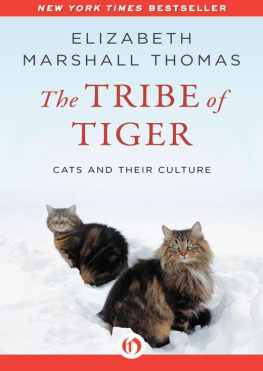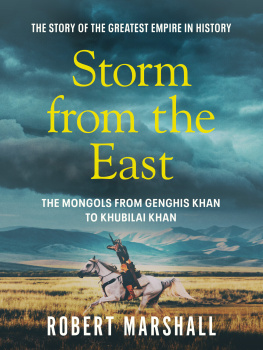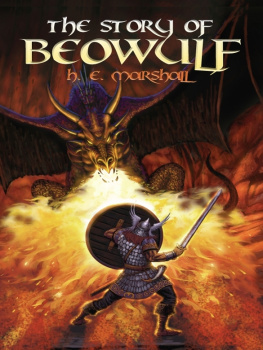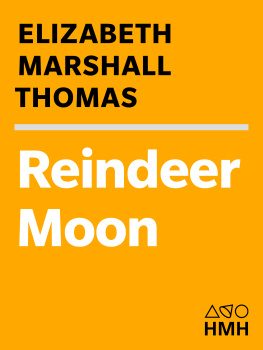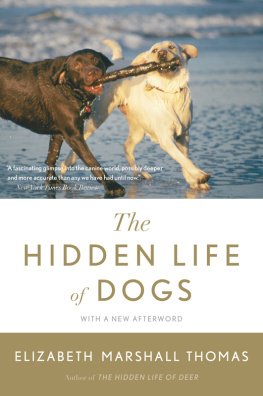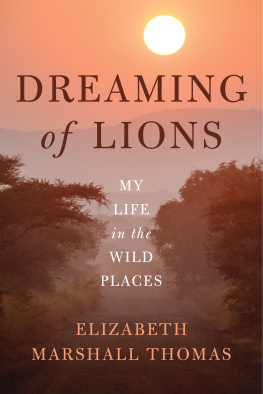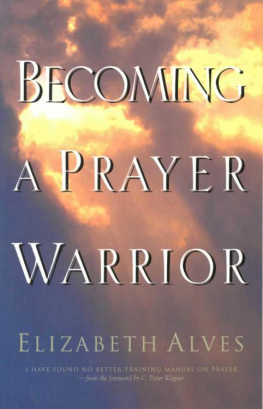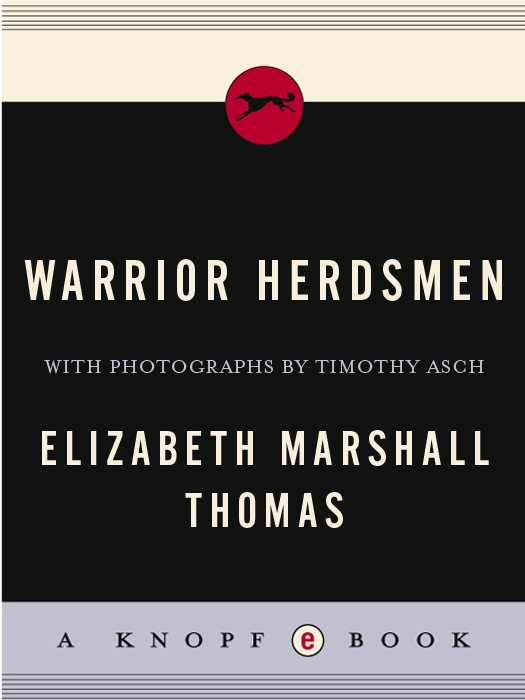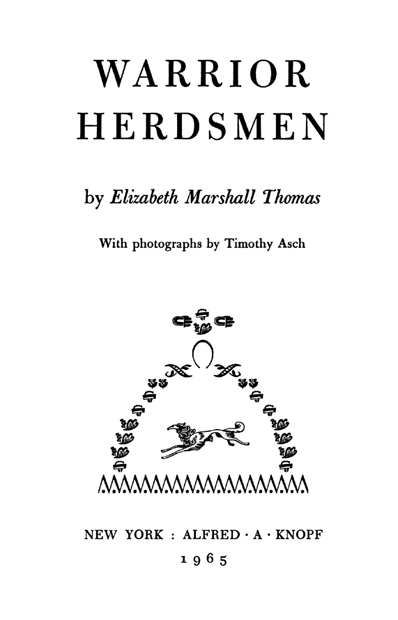BY Elizabeth Marshall Thomas
WARRIOR HERDSMEN
(1965)
THE HARMLESS PEOPLE
(1959)
These are B ORZOI B OOKS , published in New York by A LFRED A. K NOPF

L. C. catalog card number: 65-14514

THIS IS A BORZOI BOOK ,
PUBLISHED BY ALFRED A . KNOPF , INC .

Copyright 1965 by Elizabeth Marshall Thomas. All rights reserved. No part of this book may be reproduced in any form without permission in writing from the publisher, except by a reviewer, who may quote brief passages and reproduce not more than three illustrations in a review to be printed in a magazine or newspaper.
Published simultaneously in Toronto, Canada, by Random House of Canada, Limited.
Portions of this book have appeared in The New Yorker.
eISBN: 978-0-307-82649-7
v3.1
IN MEMORY OF
KIRSTI JOHNSON
To Tom Johnson,
to my parents, to John, Heather, and Sonya,
and to my children,
Stephanie and John
Acknowledgments
T HE NEW YORKER made it financially possible for us to go to Uganda to acquire material for this book, and a fellowship from the John Simon Guggenheim Memorial Foundation provided us with the necessary time to write the book. I would like to thank both these organizations and in particular William Shawn and those who sponsored me for the fellowship.
Between the time the trip was made and the writing finished, so many people helped me that I may not be able properly to thank them all, and if I should overlook someone, I would ask that person to excuse me; my gratitude and obligation are no less.
For the idea to visit Karamoja, I would like to thank Edward and Marguerite Mason. I would like to thank my parents, Laurence and Lorna Marshall, for the survey trip they made on our behalf in Karamoja and Dodoth. For the inestimable help of source material once the area was selected, I would like to thank Doctors Neville and Rada Dyson-Hudson. The Dyson-Hudsons spent many years in Karamoja and gave so generously of advice and information, showing us photographs and the then unpublished manuscript of The Karimojong, that my gratitude cannot be sufficiently expressed, nor can my debt be measured for the understanding gained by this help. I also read The Family Herds by Dr. Phillip Gulliver, and The Central Nilo Hamites in The Ethnographic Survey of Africa, by Dr. Gulliver and Dr. Pamela Gulliver, works which enabled me better to understand life in Dodoth. I am much indebted to Dr. Walter Deshler for sending us his publication, Livestock Tripanosomiasis and Human Settlement in Northeastern Uganda, a valuable article concerning the very neighborhoods we knew, which appeared in the October 1960 issue of the Geographical Review (Vol. 50, No. 4). Father Farina of the Verona Fathers wrote a dictionary of Akarimojong which we read and found helpful. James P. Barber gave us copies of his very interesting articles, The Murder of Chief Achia and The Karamoja District of Uganda, which were also very helpful. I would like to thank all these people and acknowledge my debt to them all and would also like to stress the fact that errors and misinterpretations which may occur in this book in no way accrue to any of them.
While in Entebbe and Kampala, we received warm hospitality, help, and advice from nearly everyone we met. I would like in particular to thank Mr. and Mrs. Christopher Melmouth, Mr. and Mrs. Sam Ntiro, Mr. Macoun, Mr. Powell-Cotton, Mr. Burgess, and Mrs. Fley.
In Moroto, too, we were accorded gracious help, friendship, and hospitality without which we would have been unable to continue our trip. For this I would like to thank our friends June and Jim Barber, also Mr. Allen for almost unlimited assistance and favors, also Dr. Gowan, Mr. James Locut, Mr. and Mrs. David Morris, Mr. and Mrs. Pat Howard, Mr. Robeson, Father Franco Petrocelli, Mr. Ray Cauderay, and Mr. Ishverbahi.
As we traveled north, we received kind assistance from the A.D.C. of Jie, Major Charles Lamb. When we arrived in Kaabong, we were received, fed, and housed for more than two weeks by the Kaabong Catholic Mission, whose generosity toward us was very great indeed. For this I would like to thank Father Danielli, Father Berginini, and Brother Fortunato.
For assistance and cooperation I would like to thank Chief Kamarri, Jackait Lokol, and Rose Ironga, and for hospitality I would like to thank Mr. J. B. Patel.
When we left Kaabong, we went to our own camp in Lokoki. It was there the material for this book was gathered. Not a word of the book could have been written without the information, hospitality, cooperation, and gracious friendship given us by the neighborsmen and women whose courtesy and generosity can neither be measured nor repaid. For these favors I thank in particular Lokwal Lopore and his family, especially his wife Rengen, his wife Nabilo, and his daughter Chuchu; also Lotiang Uri and his family, Mora, Nakade, Lokwang and his brothers, Lotido and his family, Nadolupe and Lokorimoe. For further information and assistance I would like to thank Lomotin, Major Groom, Mather Ojwang, Kalisto Agen, and last but by no means least, Amos J. Bala, whose interpretation of material we gathered and brought home was of inestimable value. Here again, it should be stressed that none of these people is responsible for any mistake which may be in the book.
I should also like to thank the offices of the Protectorate government, Moroto, for information on tax collection, and the office of the Protectorate Police for data and information on raiding.
To the people in our camp, I owe an inestimable debt. Tom Johnson and his late wife, Kirsti Johnson, I thank for the success of the entire venture. David B. Lotukei, interpreter and field assistant, I thank for the care and brilliance he gave to his work, for the understanding, then far beyond his years, of the project at hand, and for the pleasant graciousness of his character, through which filtered most of the work we did in Dodoth. Our debt to Timothy Asch is obvious; the beautiful photographs in this book were taken by him. Yet beyond that, I would like to offer particular thanks to him for his cooperation, for the ease in the language which he achieved very quickly, and which proved of great help, and for his assistance in gathering material. It should again be stressed that any mistakes which may well be in this book are mine and should not accrue to him. I would also like to thank Daniel Lopote, and William Aginga, with special thanks to Filomon.
I received many kinds of help with the manuscript. For their help with its typing and preparation, I would like to thank Montie Johnson and also Marilyn Wood, whose precision and encouragement speeded the work to its conclusion. For encouragement, advice, and for her expert opinion, I would like to thank Marie Rodell. For editorial assistance and for the good faith they have shown in me I would like to thank Harold Strauss, and in this context, thank William Shawn again.


